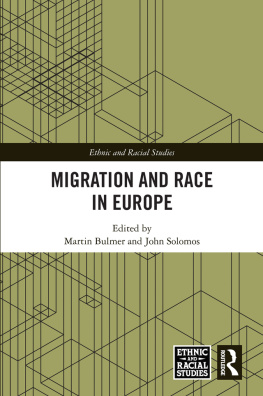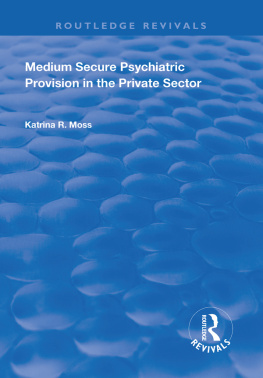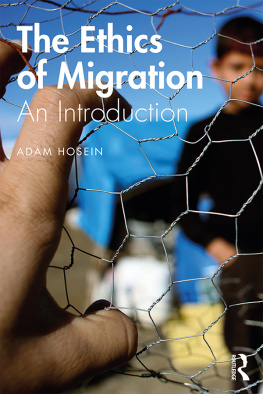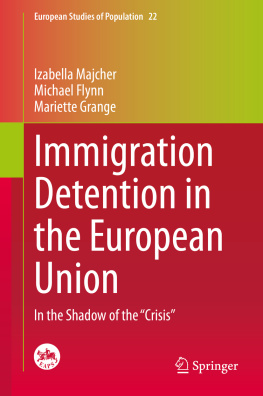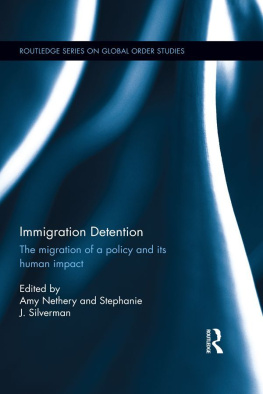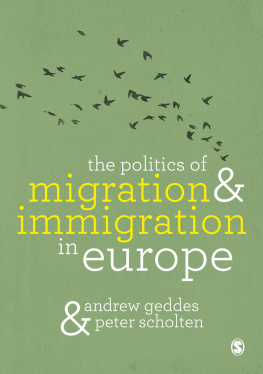PRIVATISATION OF MIGRATION CONTROL
STUDIES IN LAW, POLITICS, AND SOCIETY
Recent Volumes:
Volume 12: Edited by Rita J. Simon
Volume 3: Edited by Steven Spitzer
Volume 49: Edited by Steven Spitzer and Andrew S. Scull
Volume 1016: Edited by Susan S. Sibey and Austin Sarat
Volume 1733: Edited by Austin Sarat and Patricia Ewick
Volume 3477: Edited by Austin Sarat
Volume 78: Edited by Livia Holden and Austin Sarat
Volume 79: Edited by Austin Sarat
Volume 80: Edited by Austin Sarat
Volume 81: Edited by Austin Sarat
Volume 82: Edited by Austin Sarat
Volume 83: Edited by Austin Sarat
Volume 84: Edited by Austin Sarat
Volume 85: Edited by Austin Sarat
Volume 86A: Edited by Austin Sarat
STUDIES IN LAW, POLITICS, AND SOCIETY VOLUME 86B
PRIVATISATION OF MIGRATION CONTROL: POWER WITHOUT ACCOUNTABILITY?
EDITED BY
AUSTIN SARAT, EDITOR
Amherst College, USA
GUEST EDITED BY
DEVYANI PRABHAT
University of Bristol Law School. UK
United Kingdom North America Japan
India Malaysia China
Emerald Publishing Limited
Howard House, Wagon Lane, Bingley BD16 1WA, UK
First edition 2021
Editorial matter and selection 2021 Austin Sarat. Published under exclusive licence.
Individual chapters 2021 Emerald Publishing Limited.
Reprints and permissions service
Contact:
No part of this book may be reproduced, stored in a retrieval system, transmitted in any form or by any means electronic, mechanical, photocopying, recording or otherwise without either the prior written permission of the publisher or a licence permitting restricted copying issued in the UK by The Copyright Licensing Agency and in the USA by The Copyright Clearance Center. Any opinions expressed in the chapters are those of the authors. Whilst Emerald makes every effort to ensure the quality and accuracy of its content, Emerald makes no representation implied or otherwise, as to the chapters suitability and application and disclaims any warranties, express or implied, to their use.
British Library Cataloguing in Publication Data
A catalogue record for this book is available from the British Library
ISBN: 978-1-80117-663-7 (Print)
ISBN: 978-1-80117-662-0 (Online)
ISBN: 978-1-80117-664-4 (Epub)
ISSN: 1059-4337 (Series)
CONTENTS
Devyani Prabhat
Aleksandra Wegera
Isabella Bertolini
Emily Rigler Gillingham
Harriet Parfitt
Akosua-Rose Oppon
Isobel Kamber
LIST OF CONTRIBUTORS
Isabella Bertolini | University of Bristol, Law School, UK |
Emily Rigler Gillingham | University of Bristol, Law School, UK |
Isobel Kamber | University of Bristol, Law School, UK |
Akosua-Rose Oppon | University of Bristol, Law School, UK |
Harriet Parfitt | University of Bristol, Law School, UK |
Devyani Prabhat | University of Bristol, Law School, UK |
Aleksandra Wegera | University of Bristol, Law School, UK |
EDITORIAL BOARD
Gad Barzilai | Tel Aviv University, Israel |
Paul Berman | George Washington University, USA |
Roger Cotterrell | Queen Mary College University of London, UK |
Jennifer Culbert | Johns Hopkins University, USA |
Eve Darian-Smith | University of California, Santa Barbara, USA |
David Delaney | Amherst College, USA |
Florence Dore | University of North Carolina, USA |
David Engel | State University of New York at Buffalo, USA |
Anthony Farley | Albany Law School, USA |
David Garland | New York University, USA |
Jonathan Goldberg-Hiller | University of Hawaii, USA |
Laura Gomez | University of California, Los Angeles, USA |
Piyel Haldar | Birkbeck College University of London, UK |
Thomas Hilbink | Open Society Institute, USA |
Desmond Manderson | Australian National University, Australia |
Jennifer Mnookin | University of California, Los Angeles, USA |
Laura Beth Nielsen | American Bar Foundation, USA |
Paul Passavant | Hobart and William Smith College, USA |
Susan Schmeiser | University of Connecticut, USA |
Jonathan Simon | University of California, Berkeley, USA |
Marianna Valverde | University of Toronto, Canada |
Alison Young | University of Melbourne, Australia |
Introduction
Devyani Prabhat
This special issue is the second part of a two-part edited collection on the privatisation of migration. In Part 1, we have analysed the conceptual framework for understanding private participation in immigration control in the UK. There are clear links with national security concerns but these are always necessary for heightened immigration control. In the ordinary and everyday situations as well it is possible to engage in pervasive immigration control. Since 2010 the UK government has increased internal immigration controls by involving private individuals who control access to essential resources like health care, travel, housing, and employment. Individuals such as employers, landlords and medical professionals have been given incentives to report on immigration status as well as threatened with sanctions in case of failure to report immigration status of those whom they come in contact with during the course of their work or lives. Such practices have created fractures in British society and set up internal borders. The resulting atmosphere of hostility towards irregular migrants was initially termed the hostile environment. Following news-stories of wrongful deportations of people who had the right to remain in the UK, such as in the Windrush scandal, the hostile environment was relabelled the compliant environment.


